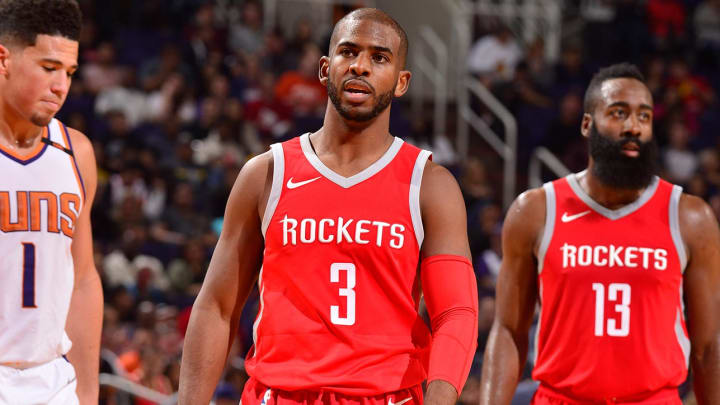Solo Artists: Chris Paul, James Harden Thriving While the Other Sits

Before Chris Paul’s return to the Rockets from a knee injury, there was some concern as to how Paul would integrate himself into a team that was running incredibly smoothly. And by some concern, I mean I wrote on this very website that James Harden’s hot hand would complicate Paul’s eventual return. These concerns, it turns out, were quite overblown. The Rockets have won seven straight games with CP3.
Houston has continued rollicking through the league with Paul back in the lineup, and the 32-year-old point guard is experiencing a bit of a rebirth now that he’s no longer directing a high-wire act every night. Albeit in a very limited sample size, Paul is on pace to average a career low in points, but also a career low mark in turnovers, and a career-high mark in three-point percentage. Basically, Paul is scoring less, but his efficiency appears to be receiving a boost from playing alongside James Harden.
And, most importantly, he seems to be happy! It’s refreshing to see Paul spend less time staring daggers into the hearts of his teammates and more time doing dope point guard stuff, like inside-out dribbles, no-look passes, and leading devastating fast breaks.
As far as playing alongside Harden goes, Paul actually hasn’t shared a huge chunk of time on the court with his MVP candidate teammate. In the eight games Paul and Harden have played together, they’ve shared the court only an average of 18.6 minutes per game. For comparison (the thief of joy, as Kyrie Irving would like to remind you), Harden shares the court with Trevor Ariza for nearly 29 minutes per game, and nearly 22 minutes per game with Eric Gordon.
Remember at the start of the season when Mike D’Antoni committed to staggering minutes between Paul and Harden? That’s been a fruitful strategy so far, with both players thriving as solo acts. Since Paul’s return, in about 10 minutes per game with him running point and Harden on the bench, the Rockets have an absurd 43.9 net rating. Again, the sample size is small, but a number like that would have been truly impossible for the Rockets last year, who grew incredibly dependent on Harden by the end of their postseason run.
Harden-led lineups are enjoying similar success. Over the last seven games, in about 17 minutes of action per game with Paul sitting and Harden playing, the Rockets have a net rating of 32.7. And while both are flourishing in the their time alone, Paul and Harden have still posted a solid net rating of 10.7 when sharing the court since the former’s return.
Okay, so you’ve just learned the net rating for seemingly every Rockets lineup combination possible, what does this all mean? The key to Houston’s success isn’t necessarily that Harden and Paul are the next coming of eggs and bacon, but moreso that the team’s offense isn’t handcuffed to one player. The Rockets can put together an elite offensive attack when one of their two best players—one of whom is an MVP candidate—is on the bench, which is uncommon for just about everyone (except for the Warriors).
NBA Power Rankings: The Upper Class Emerges
This is significant especially for Paul, who is entering the next phase of his career as the guy who is no longer the best player on his team but is still pretty damn good. Paul will be a free agent next summer, and he’s somewhat of a flight risk as long as he’s entering free agency the same time as good friend LeBron James. But he has to be happy with the early returns in Houston, which allows him to direct the show for stretches, but doesn’t force him to be the lead act every second he’s on the court. The same goes for Harden, who looked spent at the end of the playoffs, and now has a secondary playmaker to help ease his load.
While Paul is finding his path as a secondary star, the Rockets (and their fans) are likely more concerned with how this team will match up with the Warriors. In that regard, Houston’s lineup flexibility may be more notable than the Harden-Paul pairing. Adding Luc Mbah a Moute and P.J. Tucker in the summer gave Houston the kind of 3-and-D types needed to match Golden State’s small-ball units.
A lineup to keep an eye on? A Paul-Harden-Tucker-Mbah a Moute-Gordon unit, which won’t really be able to defend anybody for long stretches, but can turn a game upside down with shooting. That group has played only nine minutes together, but could get some run as the regular season progresses. (Ariza can also slide into that group seamlessly.) While Houston keeps blowing everybody out, I’d expect D’Antoni to tinker with those kinds of groupings in advance of the playoffs.
For now, though, the Rockets have laid to rest any concerns about a rift emerging between their ball-dominant backcourt mates. Paul and Harden are enjoying their honeymoon period. Any worries will have to wait until the postseason.

Rohan Nadkarni covers the NBA for SI.com. The Mumbai native and resident fashion critic has written for GQ.com, Miami Herald and Deadspin.